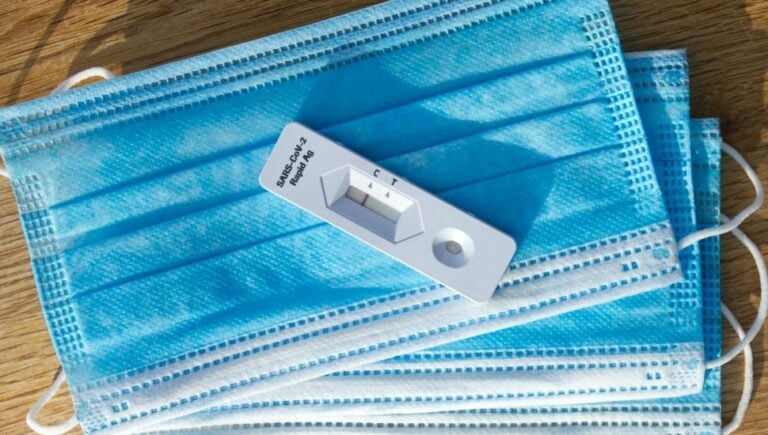This is how one of our writers spent New Year’s Eve: after their housemate tested positive for COVID-19 one week before the 31st, they faced a tight race to be declared safe to celebrate with friends. A searing heatwave and overwhelmingly long queues meant getting a PCR test wasn’t possible, which left a Rapid Antigen Test as the only option. Lengthy internet searches and desperate calls to several stores located not one RAT; our writer instead spent NYE self-isolating alone, despite having barely any actual COVID symptoms.
It could all have been avoided.
Several weeks prior, The Brag Media, like so many other companies in Australia, placed an order for RATs (the two brands ordered were Orawell and Hough). Our order of 200 tests, we felt, was a fair amount, able to cover employees and visitors at our Sydney office, while not taking too many RATs from those in need.
A few days ago, we finally received word from our importer. “Just wanted to give you a heads up on the stock of Rapid Antigen Tests you have ordered,” they emailed. “Suffice to say things are hectic at the moment but also very frustrating for us in receiving our stock.
“Without going into too much detail, what I can tell you is there is an issue across the industry at the moment for all suppliers in terms of the Government intercepting and procuring stock that comes into the country before we can access it. It is and has delayed our shipments to date, and is extremely frustrating for us.
“Both our shipments over the last few days have been affected as a result.”
All the importer – who we have chosen to keep anonymous – could really do was apologise repeatedly, the matter essentially out of their control.
Ours isn’t an isolated example. “This is the same for all suppliers in the market, not just for us,” as our importer stated.
As per a report by SBS, Adelaide Direct Stationers (another RAT wholesaler and retailer) also had their orders stopped at the border.
“Dear customer, since selling out of initial rounds of supply for Rapid Antigen Tests (RATs) we have been taking pre-orders, anticipating further supply in the New Year,” a message posted on its website said. “Our supplier has since informed us that our scheduled delivery will no longer be delivered to us due to government action to seize RAT supply at the point of import for public health reasons.”
Last week, the federal health department bought $62 million worth of RATs using the “extreme urgency or events unforeseen” provisions of its procurement rules. They were forced into such an extortionate spending spree in order to provide free RATs to lower-income Australians.
The “extreme urgency or events unforeseen” condition is probably not familiar to most people. The condition allows the federal government to avoid the goods going to an open tender process. Put another way, the government has seemingly placed itself above all other commercial entities. ‘Sorry for our lethargy and incompleteness,’ they’re essentially saying, ‘but we need to butt in front of you in the queue now.’
The government has denied that this is genuinely the case though.
“It is doing so through negotiations with suppliers through normal commercial channels, and is not seeking to place itself ahead of other commercial and retail entities,” a spokesperson recently said. They also insisted that no mandate had been issued to divert RAT supplies.
The extenuating circumstances should be acknowledged. Few saw the Omicron variant rising so suddenly and ferociously. The huge increase in infections is undoubtedly placing immense strain on the RATs supply chain. It must also be noted that airports have been hit with large numbers of workers being absent due to contracting the virus. As a result, planes have been waiting longer to be unloaded; further delays are expected for incoming shipments for the rest of January.
It never should have reached such a drastic stage. As Labor leader Anthony Albanese said, “this was foreseen.” RATs were approved for general public use all the way back in September. Since then, PM Scott Morrison and his government has been insisting that the main strategy was to live with the virus.
Even as far back as last June, Morrison had been praising the benefits of daily RATs during a trip to Europe. Wherever Morrison travelled in Europe last year, RATs were there. The British government mailed them to citizens for free; Germany started using them as a condition of entry to many venues.
The focus shifted to vaccination rates in Australia and RATs fell by the wayside. They even fell behind PCR tests, not thought to be as useful as those at detecting the virus. Now RATs are an alarmingly prominent part of Australia’s current COVID strategy. The idea that it happened overnight, though, is dangerous thinking.
And now we have ended up here: we have restaurants on UberEats selling RATs alongside burgers and chips for startling prices; SEND is stocking tests alongside its usual range of supermarket goods; we have the country’s consumer watchdog monitoring thousands of reports of price gouging; we witness eBay and Gumtree banning their sale due to infighting and ridiculous pricing.
The commodification of our health has turned the current situation into a Battle Royale. We shouldn’t be reading headlines in the Sydney Morning Herald calling the search for locating RATs as an “extreme sport”.
Victoria at least received a boost this week: the state’s emergency and health workers, community groups, and people with pre-existing health conditions will start receiving their share of millions of free rapid antigen tests on Monday.
For a company like us, the wait goes on. For how much longer, neither we nor our importer can really say. The government is correct to be offering RATs to lower-income Australians now, however, with this latest wave of COVID at its peak, it all feels a little too late. Some basic foresight and pre-planning would have gone a long way.

































